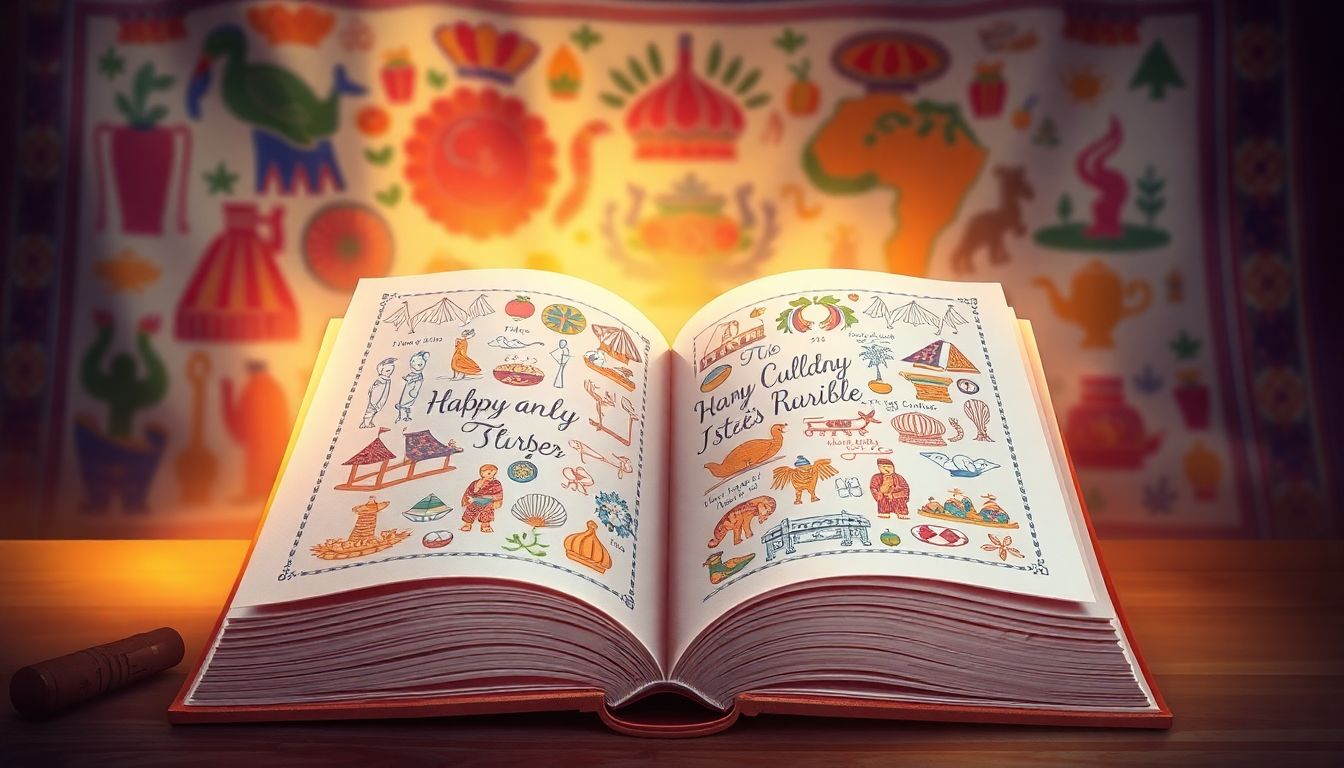Cultural storytelling can be a daunting task, especially with so many rich narratives and traditions to consider. It’s easy to feel overwhelmed when trying to connect stories with the vibrant tapestry of our diverse backgrounds. You’re not alone if you’ve ever struggled to begin or find the right way to bring these tales to life.
But don’t worry! By using prompts tailored for cultural storytelling, you can unlock creativity and effectively express the richness of your heritage. Stick with me, and together we’ll explore various prompts that will set the stage for your storytelling adventure.
From sharing folklore to crafting characters deeply rooted in cultural contexts, we’ve got tons of ideas lined up. You’ll soon be equipped to delve into personal and intergenerational stories that celebrate the unique perspectives we all bring to the table!
Key Takeaways
- Cultural storytelling can feel overwhelming, but using prompts can spark creativity.
- Engaging prompts help you explore and share stories related to your heritage.
- Focus on relatable characters and clear themes to structure your narratives.
- Your stories can bridge cultural divides and highlight diverse perspectives.
- Integrate personal experiences to connect your individual story to broader cultural narratives.
- Encourage intergenerational storytelling to foster understanding and preserve traditions.

ChatGPT Prompts for Cultural Storytelling
Using ChatGPT for cultural storytelling can be both fun and enlightening.
These prompts help you weave stories that reflect deep cultural narratives and celebrate diverse traditions.
Here are some engaging prompts you can use right away:
- Create a dialogue between two characters from different cultural backgrounds discussing a shared tradition.
- Write a short story based on a local folklore of your choice, incorporating local dialect and customs.
- Describe a festival through the eyes of a newcomer experiencing it for the first time.
How to Use Prompts for Building Cultural Narratives
Building cultural narratives starts with a clear structure and relatable characters.
Follow these steps to create your narrative using prompts:
- Identify the cultural context or theme you want to explore.
- Choose prompts that resonate with that theme. For example, “Tell a story about a family heirloom that has been passed down through generations.”
- Develop characters that reflect the cultural background you are highlighting. Use prompts like, “Create a character inspired by your own cultural background, detailing their struggles and triumphs.”
- Weave these elements into a cohesive story, ensuring that the cultural aspects enhance the plot and character development.
Top ChatGPT Prompts for Sharing Folklore and Traditions
Sharing folklore and traditions can be a gateway to understanding cultural values and history.
Here are some effective prompts to help you begin:
- Write a fable that conveys a moral lesson rooted in your culture’s traditions.
- Describe a traditional dish from your culture and the story behind its ingredients or preparation methods.
- Create a story that connects modern-day life to an ancient legend from your culture.
- Share an oral tradition from your culture that has been passed down through generations and explain its significance.
Prompts that Highlight Cultural Diversity and Perspectives
Encouraging diverse perspectives in storytelling enriches the narrative and fosters understanding.
Try these prompts to highlight cultural diversity:
- Write about a holiday celebration from the perspective of someone experiencing it for the first time.
- Create a conversation between two characters of different cultural backgrounds discussing their views on life.
- Explore a global issue through the lens of various cultural perspectives. For example, “How do different cultures perceive family responsibilities?”
- Develop a narrative that contrasts urban life with rural traditions in two different cultures.
For more examples of creative prompts, check out our post on Creative Writing Prompts to inspire your storytelling journey.
Also, if you’re interested in prompts tailored for specific topics, visit Prompts for College Essays where we explore the intersection of education and storytelling.

Creating Characters Through Cultural Context with ChatGPT
Creating rich, layered characters is essential for compelling storytelling.
Cultural context adds depth to characters, helping them resonate with readers.
Here are some prompts to help create characters deeply rooted in their cultural backgrounds:
- Construct a character who embodies the values of your culture’s proverbs. Describe their life and the lessons they’ve learned.
- Create a character from a marginalized culture facing challenges that highlight societal issues. Detail their struggles and resilience.
- Imagine a historical figure from your culture and write from their perspective, revealing their internal thoughts and motivations.
- Design a character whose life intersects with a significant cultural event and depict how it shapes their identity.
Using Prompts to Explore Historical Events in Storytelling
History is a treasure trove of stories, and exploring it through narrative can be enlightening.
Using prompts to tell historical stories can provide insight into cultural identities and values.
Consider these prompts to integrate historical events into your storytelling:
- Write a story set during a pivotal historical event, focusing on a character’s personal experience during that time.
- Invent a fictional account of a lesser-known historical figure from your culture, expanding on their impact on society.
- Detail the experiences of a family as they navigate through a major historical change, emphasizing how it alters their lives.
- Create a dialogue between two characters living in different historical periods, discussing how their cultures shaped their worldviews.
Encouraging Personal Stories Inspired by Cultural Backgrounds
Sharing personal stories helps connect individual experiences to broader cultural narratives.
Here are some prompts to guide personal storytelling based on cultural heritage:
- Write about a memorable family gathering that showcases cultural traditions and how they’ve shaped your identity.
- Describe a personal artifact from your family’s history and the story behind its significance.
- Share a transformative event from your life that reflects your cultural identity or heritage.
- Create a story about a lesson learned during a culturally significant time in your life, detailing how it influenced your values.
Prompts for Intergenerational Storytelling Across Cultures
Intergenerational storytelling fosters connection between different age groups and cultural backgrounds.
These prompts can help engage your audience in meaningful cross-generational narratives:
- Write a letter from a grandparent to a grandchild, sharing cultural wisdom and traditions.
- Imagine a conversation between a young person and their elderly relative about how cultural practices have evolved over time.
- Detail a family tradition that has changed over generations, exploring its significance and impact on identity.
- Create a narrative that shows a young person teaching an elder about modern cultural shifts while learning about traditional values in return.

Tips for Customizing Prompts for Your Cultural Storytelling Needs
Customizing prompts for your unique storytelling goals allows for deeper connections and relevance.
Start by considering the specific cultural elements you want to highlight.
Next, tweak existing prompts to better fit your narrative’s tone and themes.
- Modify this prompt: “Write about a childhood memory” to “Describe a childhood memory that reflects your cultural heritage.”
- Change “Create a character” to “Design a character that embodies the spirit of a cultural festival you cherish.”
- Use context-specific language that resonates with your audience.
- Lastly, use geographical or dialectal references to ground the story in a specific culture.
Examples of Effective Cultural Storytelling Prompts
Having specific prompts handy can spark creativity and guide you in your storytelling journey.
Here’s a list of effective prompts you can use:
- “Tell the origin story of a beloved cultural tradition and its significance within your community.”
- “Describe your favorite family recipe and the memories tied to preparing it with your family.”
- “Write a diary entry from the perspective of a historical figure during a significant event in your culture.”
- “Create a story about a cultural misunderstanding that leads to a valuable lesson for both parties involved.”
- “Share a tale that illustrates the impact of a traditional belief or value on modern life in your culture.”
FAQs
ChatGPT prompts for cultural storytelling are tailored statements or questions designed to inspire narratives that reflect different cultures, traditions, and histories, allowing users to explore and share diverse cultural experiences through engaging stories.
To customize prompts, consider incorporating specific cultural elements, stories, or historical contexts unique to your background. This ensures that the prompts resonate with your experiences and encourage authentic storytelling.
Effective cultural storytelling prompts might include questions like, “Share a family tradition that shaped your identity,” or “Describe a folklore tale that conveys a moral lesson within your culture.”
Intergenerational storytelling is crucial as it preserves cultural heritage, passing down traditions, values, and experiences between generations, fostering understanding and appreciation while promoting connections among family and community members.
